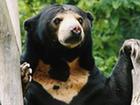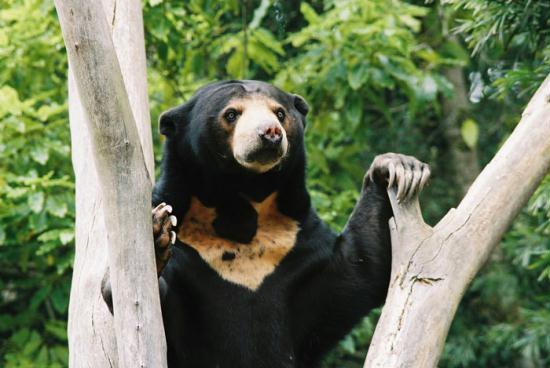| Videos | ? Latest |
|
? Feature | ? Sports | ? Your Videos |
World's smallest bear face extinction

 0 Comment(s)
0 Comment(s) Print
Print E-mail CNTV, June 5, 2012
E-mail CNTV, June 5, 2012
Cambodia is home to the largest population of sun bears left in the wild. As the world's smallest bear species, they are now facing a high risk of extinction due to the twin threat of habitat loss and illegal hunting. Charities are working hard to save the remaining animals, but are they fighting a losing battle?
Could anyone be so cruel as to touch the hairs on these cuddly heads?
Sadly, the answer is yes.
They are called Sun bears, or honey bears, named after their long slender tongue used to extract honey from beehives.
These are the world's smallest bear species. They are easily recognisable by a horseshoe-shaped yellow marking on their chest.
And now they are at the brink of distinction.
 |
|
As the world's smallest bear species, they are now facing a high risk of extinction due to the twin threat of habitat loss and illegal hunting. |
And to add to their misfortune, their relatively inoffensive nature and small size make them an easy capture to be bred as exotic pets.
Matt Hunt, Chief Executive of Free the Bears, has spent ten years working to protect the species in Cambodia. And he is becoming increasingly concerned.
Matt Hunt, Chief Executive of Free the Bears Fund, said, "Their long term prospects are not looking good based purely on the amount of human population growth, the amount of habitat that's being lost for the species, and of course the amount of hunting that is increasing due to the fact of people's wealth increasing and so more people are demanding traditional medicines or exotic animal dishes."
Sun bears population has dropped by at least 30 per cent in the past 30 years. And their numbers are continuing to decline at that rate.
There are currently 84 sun bears housed at the rescue facility.
These two were saved in 2009. They were critically injured.
The fund works around the clock to fight for the animals. But there's only so much they can do without more government action.
Matt Hunt said, "We need a lot more protected area, law enforcement going on. We need greater enforcement around the borders to stop bears being transported across borders and a lot more education and awareness to make sure that people are no longer asking for Bear Paw Soup in restaurants or for bear gall bladders."
Sun bears are among the least studied bears in the wild. And now there's the looming possibility that they will be wiped out even before they have been properly understood.





